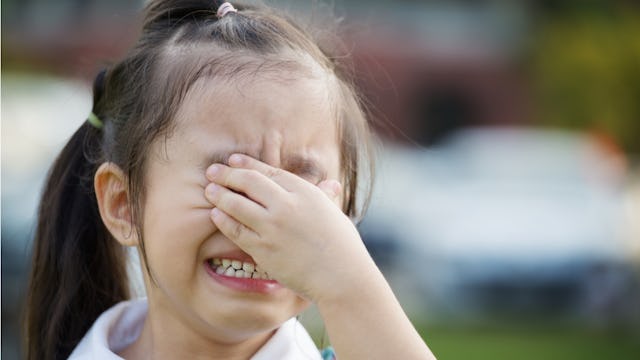To Our Kids, Little Problems Are Big, Important Problems

My kindergartner got off the bus after school the other day and rocketed excitedly toward the house. I could tell he had something big to tell me, so I met him at the door, beaming in anticipation. But I didn’t even get a “Hi, Mom!” — because after a quick hug, the first thing he said was, “I want SpaghettiOs!”
SpaghettiOs? Really? “That’s what you came speeding in here for?” I laughed.
But he was all business. “Yes,” he said solemnly. “I’ve been thinking about them since lunchtime. I was thinking about them the whole way home on the bus. I really want some SpaghettiOs, please, Mom.”
I hated to break it to him, but dinner was already bubbling away on the stove; we were eating early that evening because of an earlier-than-usual Scout meeting, and if I gave him SpaghettiOs, he would most certainly not eat the (more balanced) meal I had prepared. I explained this to him, then followed up with the suggestion of a smaller snack, like a granola bar or something.
He wasn’t having it. You’d have thought I had told him he was never allowed to eat again and he would slowly and miserably waste away. His face crumpled and the waterworks started. He collapsed onto the floor, backpack still on, and wailed, “I hate it here!”
Oh, the drama.
As I watched him writhe around, sobbing piteously, I marveled at how this tiny, insignificant thing could move him to such a state of angst (and you know, rolled my eyes until I could practically see the back of my skull). I’m sure there were other factors at play; he was probably tired after school, and every parent knows that a tired kid will melt down over virtually anything. But after my eyeballs resettled to their default position, I got to thinking: In the grand scheme of things, most kids haven’t experienced much real hardship, so for them, even these trivial concerns probably are “that bad.”
Consider the concept from our perspective. As adults, we know what’s worth stressing out over and what isn’t (most of the time), but that comes with practice. By the time we grow up, we’ve been through events that are life-changing and dealt with crisis (or at least near-crisis) situations. But no matter how bad we’ve had it, there’s always — always — someone who has had it infinitely worse.
My oldest son once had a rare kidney disease that could have posed more serious, far-reaching health complications, and I was petrified for him while we waited to find out the extent of the damage. But my niece had cancer at the age of 2, and I can’t even fathom how frightened my sister must have felt while her baby’s life hung in the balance. Still, just because someone else has it worse doesn’t mean my feelings were invalid, because in the smaller scope of my experience, that was the worst thing I’d ever been through as a parent.
When we’re having a rough time, we need empathy and support, not somebody telling us that our bad day isn’t really bad just because there are more dire situations. If someone’s getting a divorce, you don’t tell them, “This is nothing. Just wait until your ex cleans out your bank account and tries to take your kids!” You offer your compassion, because sure, their divorce could be messier, but this is the worst divorce they’ve ever been through.
The same concept applies to anything anyone is going through. If it makes them feel upset, that’s legitimate, even if in our unique perspective it doesn’t seem like a big deal.
So when it comes to our kids, who haven’t experienced much at all in the way of adversity, the small things are actually pretty big things — at least in their tiny worlds. And thinking about this makes me feel a twinge of mom guilt about all the times I’ve inadvertently trivialized their concerns, things that seemed like a nonissue to me. Who am I to judge whether something is actually legit enough for them to be upset about? What if my kids don’t come to me when the stuff really is big stuff because I didn’t take them seriously when it wasn’t?
I didn’t give in to the request for SpaghettiOs (because, dinner). But I also didn’t laugh at him for breaking down over my refusal, because my 5-year-old has been lucky enough to be sheltered from anything more serious than not being able to have the food he’s been craving, and so in his limited perspective, this was actually pretty awful. It wouldn’t have done me any good to lecture him about how “some kids never, ever get SpaghettiOs” or go on about all the children who are literally starving right now. I didn’t begrudge him his anguish. I just gave him another hug and let him know that I understood why he was so upset.
Even if it was over a denial of canned goods.